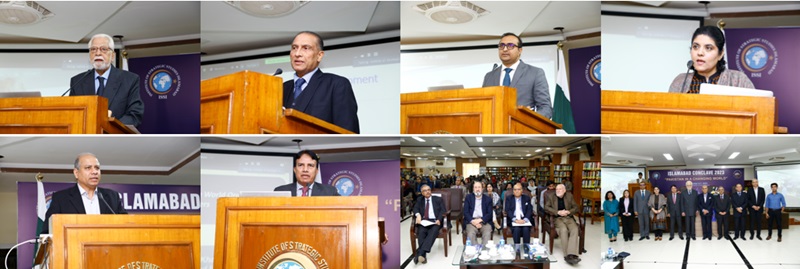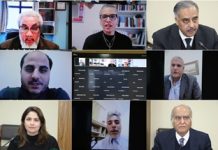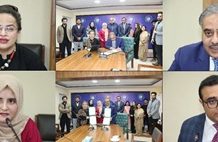Islamabad Conclave-2023
“Pakistan in a Changing World”
December 6-7, 2023
Press Release
Working Session V
“Pakistan’s Foreign Policy in Emerging World Order”

The fifth working session of Islamabad Conclave titled ‘Pakistan’s Foreign Policy in Emerging World Order’ was organized by the India Study Centre at the Institute of Strategic Studies Islamabad (ISSI) on December 7, 2023. Ambassador Inam ul Haq, former Minister and Secretary of Foreign Affairs; Ambassador Aizaz Ahmad Chuhadry, Former Foreign Secretary; Dr. Muhammad Khan, Chairperson, Department of Social Sciences, International Islamic University Islamabad (IIUI); Dr. Arshi Saleem Hashmi, HoD, Department of Peace and Conflict Studies, National Defene University (NDU); and Dr. Farhan Hanif Siddiqui, Associate Professor, School of Poltiical Science and International Relations (SPIR) provided valuable insights into the challenges and opportunities that Pakistan faces on the regional and global stage. Dr. Khurram Abbas, Director India Study Centre moderated the session.
Ambassador Inam ul Haq, in his keynote address, highlighted the evolving global landscape with the rise of different poles, especially the ascent of China and Russia. He emphasized the perceived challenges to the rule-based order posed by a resurgent Russia and the economically rising China. Discussing geopolitical shifts, he raised important questions about how Pakistan should respond to the changing world, navigate great power competition, contribute to peace and development in South Asia, and engage with the global south. Ambassador Inam underscored the importance of understanding and adapting to the emerging power equations and hierarchies. He explored the complexities of the present global environment marked by authoritarianism, populism, and neo-fascism in the West, as well as the challenges to liberal values. He further delved into the role of major powers, alliance politics, and the ongoing dynamics between the US, China, and the ‘Global South’. He presented way forwards for Pakistan in the changning world environment.
Ambassador Aizaz Ahmad Chuhadry provided insights into the prospects of peace and development in South Asia. He traced out four theaters that have drawn international attentions as South Asia, Ukraine, Gaza and Indian Ocean. Ambassador Aizaz highlighted the challenges and observed that clarity about future trajectory of regional developments would emerge after upcoming elections in India and Pakistan. Pakistan’s neighborhood is still posing certain challenges to the country, as humanitarian crisis and surging terrorism in Afghanistan and state-sponsered extremist agendas in India. Due to these complexities, South Asia remains the least integrated region in the world. Ambassador Aizaz suggested that for a peaecful region, Pakistan and India needed to have communication and engagement to address the challenges in bilateral relations and realize opportunities in the regional context.
Dr. Muhammad Khan discussed the challenging task of balancing in Pakistan’s foreign policy goals amid a changing world order. He briefly touched upon Pakistan’s historical choices, challenges in maintaining balance between China and the US, and the need for continued dialogue to resolve outstanding disputes. He suggested that Pakistan, for its wider intersts, should engage with all major powers, chose its own options, and avoid getting entangled in any rivalry.
Dr. Arshi Saleem Hashmi discussed Pakistan’s position in the developing world, emphasizing the need to adapt to changing scenarios. Contrary to the notion that Pakistan’s policy lacks direction, Dr. Hashmi highlighted historical trajectories and called for a focus on ‘peace within, and peace without’, adapting to the changing international order.
Dr. Farhan Siddiqui discussed the emerging trends and the future of global dynamics, while highlighting the evolving relationship between the United States and China, emphasizing on economic partnership and trade balance. He pointed to new term “multiplexity” to describe the move towards a post-Western order, characterized by multiple regional powers collaborating in forums such as BRICS, AUKUS, QUAD, and BRI. The discussion underscored the interconnectedness of foreign policy with domestic factors, highlighting the need to focus on internal peace and structural reforms. Advocating a hedging strategy, Dr. Farhan urged to move beyond a Western-centric approach and diversify the policies, particularly by engaging more with the middle powers and the developing world. The integration of strategic and economic security was emphasized, recognizing the interdependence between military and economic strength.
The session was followed by a Q&A session. Towards the end of the session, Chairman BoG ISSI Ambassador Khalid Mahmood presented ISSI’s memento to the esteemed panelists. Besides the distinguished speakers from Pakistan and abroad, the session was attended by a large number of scholars, academics, researchers, practitioners, students, members of the diplomatic corps, and representatives of the media.











